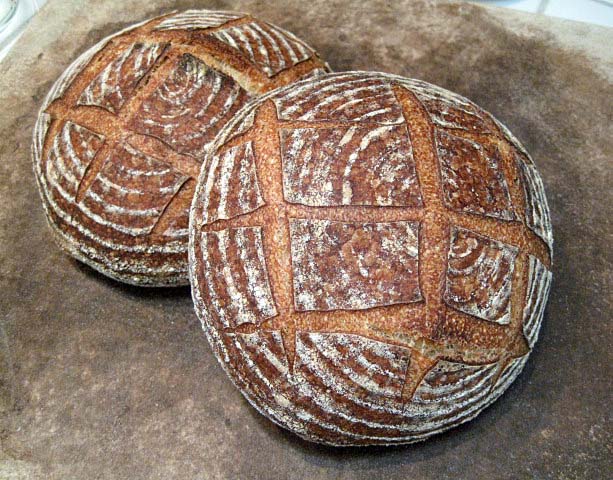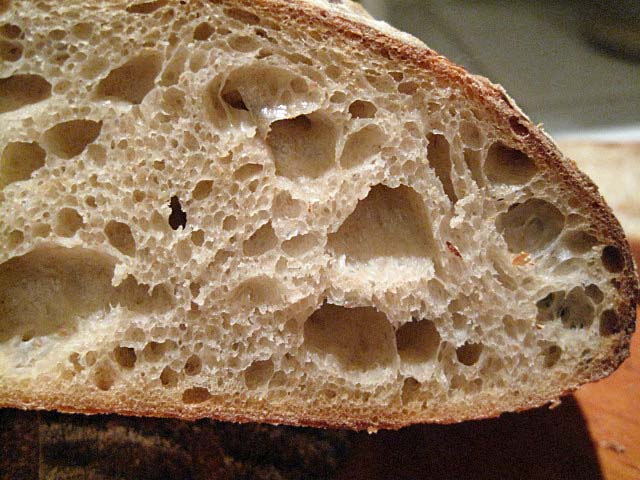
My San Francisco Sourdough Quest, Take 2
A couple weeks ago, I blogged on my attempt to make a San Francisco-style sourdough bread that had a crunchy crust, moderate sourness and a nice, complex flavor. (See My San Francisco Sourdough Quest).
My quest continued this weekend. The formula and method were amended in these ways:
1. Rather than activating my starter at 100% hydration and building my 50% hydration levain from that, I activated my stored 50% hydration starter at 50% hydration. In other words, I did two firm starter elaborations. These were fed at 12 hour intervals.
2. The levain was then fermented at room temperature for 16 hours and was not retarded.
3. The final dough was mixed substituting 10% whole wheat flour for some of the AP flour.
Otherwise, my formula and method were as described previously. I should point out that, with these changes, the only differences from the formula and method for San Francisco Sourdough found in Advanced Bread & Pastry were:
1. The substitution of some WW for AP flour,
2. The longer fermentation of the firm levain, and
3. The higher fermentation and proofing temperatures or the final dough and formed loaves.


The results were very similar, but the bread was substantially more sour. I'd rate it as moderately to very sour. The crumb was a little less open, presumably because the WW flour absorbed a little more water. I loved it. My wife loved it. I recommend it.
David


Comments
Fine looking loaves David.
Definitely two very important procedures for getting more sour out of sourdough: let the starter ripen longer (thereby making it more acidic) and higher proofing temperatures which favour the lactobacilli. I get really sour loaves quite often in the summer here in Taiwan without even trying. But if it gets too acidic everything degenerates into a weeping proteolytic mess. I favour a milder tang myself which is why I discard most of my starter each time I refresh it thus encouraging the yeast more than the lactobacillus. I also only let it ripen for somewhere between 5 to 6 hours and use cold water to keep the dough temp down. I must say, I don't feel a firm starter has any particular advantage over a 100% hydration starter when it comes to making a sourer sourdough. But I do think a firm starter which has been left to mature in the fridge for a few days does produce a more complex flavour than a liquid starter.
Best,
Syd
My experience with firm vs liquid starters is similar to yours. The other point is that a firm starter that is retarded is less subject to proteolysis than a liquid one and that there is an advantage to using a higher gluten flour for the starter that will be fermented for a longer time.
David
my understanding is that it takes a long time for a stiff starter, made from a liquid one especially, takes a long time to develop a the unique flora that is typically attributed to it. Pretty sure I got that from Debra Wink but I could be mistaken. .
Sorry if this is covered elsewhere, but what starter/water/flour ratios did you use for the levain? Did you change it at all from last time because of the much longer fermentation?
I fed the levain as described in the previous blog. The difference was that, this time, I went through two feedings at 50% hydration before using the levain in the final dough.
David
I can't speak for others, but I have learned much from your quests and experiments over the years. I too experiment but you seem to have a higher success rate than I, and will look forward to future posts.
David
Intriguing series of experiments, David. I don't have the proofer to get the steady high temperature, but I'm going to try my SF Country Sourdough formula with the longer fermented levain and warmer fermented dough (using my microwave with a pitcher of hot water). I'm not sure I'll like it sourer, but I gotta try these techniques.
Thanks.
Glenn
The experiments could well be filed under "reinventing the wheel." Alternatively, it could be filed under "everything matters." My personal goal is to gain a greater control over the nuances of flavor.
Before I got the Folding Proofer, I used the microwave to raise the temperature. I could get it up to 78-80 degrees F at most. That's good for bulk fermentation, and that's where most of the flavor development happens. The higher temperature (85 degrees F) for proofing just speeds things up.
I do like a pretty sour bread when it's mostly white flour or high-rye. I'm less fond of too much sourness for mixed grain or mostly whole wheat breads. Your taste may differ, of course.
The SFSD made delicious panini for dinner tonight - chicken, arugala, caramelized onions in balsamic vinegar, emmenthaler and a light smear of deli mustard.
David
Hi David,
I am enjoying coming along for the ride on your noble quest :)
Your formula sounds great. Nice work.
Cheers,
Phil
David
probably helped the sour too I would think. The crumb seems more even and a deeper richer light brown?
I know you won't quit till it is spot on.
Hi David,
Admiring the burnished crust and amazing crumb!
These two are just as gorgeous as the last two.
:^) from breadsong
David
David, did you still use 2.15 oz of stiff levain? Also, why did you choose oz instead of grams for recording your recipe?
(grateful lurking learner and TFL fan/baker)
I believe I did use 2.15 oz of stiff levain.
I used oz rather than grams because I started with a formula that was in oz and was too lazy to convert it at the time. It's on my to do list.
David
Hi David,
Interesting to read implied differences of view concerning sourness and stiff levains. I use the stiff levain made with bread flour as I think it makes for greater tolerance..both in the leaven stage and in final dough quality. I don't think I have a definite opinion on sourness. But, using warmer temperature will obviously have an impact.
It looks a beautiful loaf, great crumb, especially. For me, I'd go less sour, but a bit more wholemeal! But, then it wouldn't be a San Francisco Sourdough I guess, would it!
All good wishes
Andy
I made two more loaves of this SF SD bread today. They are retarding to be baked tomorrow. Stay tuned! I made them with a stiff levain fed with bread flour (12.5% protein) and a bit of medium rye. And they will be double the size of the last two bakes - 994 g each, pre-bake.
I happen to enjoy an assertively sour loaf, as long as that's not all there is to the flavor. Tomorrow's SF SD should be pretty sour. I let the levain get pretty ripe before mixing and fermented at 76 degrees F.
I must confess, my head is a bit wobbly on details. I did Hamelman's Pain au Levain and the Tartine Basic Country Bread today as well as the SF SD. Between the mixes and the frequent S&F's for the T-BCB, not to mention the clean-ups, I was on my feet and running from dough to dough most of the day. It was loads of fun but also confimed that I'm too lazy to ever want to be a professional baker.
Thanks for your kind words.
Regards,
David